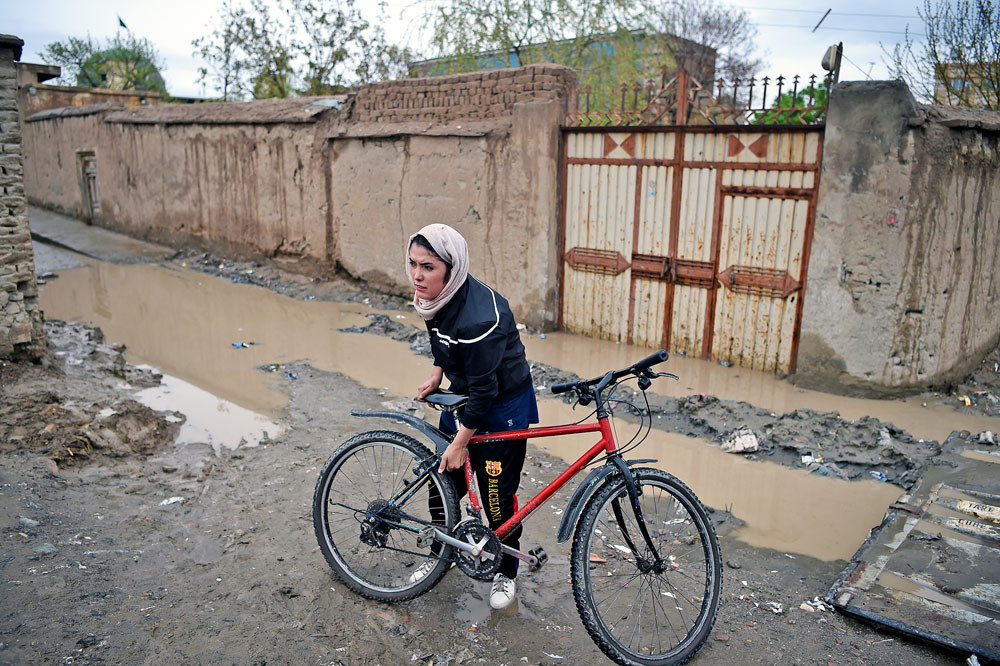Popular Reads
Top Results
Can't find what you're looking for?
View all search resultsPopular Reads
Top Results
Can't find what you're looking for?
View all search resultsInvesting in women is investing in peace, Indonesia tells Afghanistan
Indonesia hosted dozens of Afghan women in a dialogue on empowerment at the weekend, which aimed to help increase their roles in nation-building.
Change text size
Gift Premium Articles
to Anyone
 A life of freedom: In this photo taken on April 14, Afghan cyclist Kobra Samim adjusts her bicycle on a street in Kabul. Across Afghanistan, women have taken to social media to join a campaign dubbed #MyRedLine that aims to pressure the government, the Taliban and the United States into ensuring women’s hard-won advancements are not tossed aside in the rush for a peace accord.
(AFP/Wakil Kohsar)
A life of freedom: In this photo taken on April 14, Afghan cyclist Kobra Samim adjusts her bicycle on a street in Kabul. Across Afghanistan, women have taken to social media to join a campaign dubbed #MyRedLine that aims to pressure the government, the Taliban and the United States into ensuring women’s hard-won advancements are not tossed aside in the rush for a peace accord.
(AFP/Wakil Kohsar)
I
ndonesia’s most senior diplomat has urged Afghanistan to empower its women so that they can play a more significant role in peacebuilding, calling on the government to draft more inclusive policies and promote affirmative action in the war-torn and ultra-patriarchal country.
In support of the Afghan peace process, Indonesia hosted on Friday a two-day dialogue featuring dozens of Afghan women led by Acting Minister for Information and Culture Hasina Safi.
Foreign Minister Retno LP Marsudi, Indonesia’s first woman foreign minister and a champion of women’s empowerment in foreign policy and peacebuilding, called on the Afghan government to put in place mechanisms to fulfil women’s specific needs.
“If we want to invest in peace, then we should invest in women,” the minister asserted in her opening speech. “There can be no peace nor stability in Afghanistan, or in other countries, without the involvement of women.”
Dialogue, as a tool for peacebuilding, is also a very important way to bridge the differences among Afghan women from various backgrounds, Retno said, underlining Indonesia’s insistence that no woman or girl should be left behind in the future of Afghanistan.
In another pledge of support for Afghan peace, the minister said Indonesia would follow up the Jakarta dialogue with a number of training and skilling projects for Afghan women, and said she would visit the country early next year as a follow-up to current proceedings.
The two sides must identify concrete steps to enhance the role of women, helping to formulate policy that encourages their participation in the economic field or women’s rights protection.
“What we want to see is a durable peace in Afghanistan – I know that almost every Afghan feels fatigue at the conflict and war in Afghanistan,” she said.
Acting Minister Safi welcomed Indonesia’s initiative and said that Friday’s event would further strengthen cooperation for peace in Afghanistan, especially among women of the two Muslim-majority countries.
The event has allowed women to speak about empowerment in an enabling environment – something that is still hard to come by in Afghanistan despite the government’s efforts.
When extremist Taliban insurgents swept to power in 1996, women were forced to stay home, barred from most jobs and deprived of their right to an education.
After the militants were toppled in late 2001 and a United States-backed government took over, gender equality was enshrined in the Afghan constitution, though discrimination remains rife.
While women have made significant gains since the days of the Taliban, they are still subject to deeply held sexist beliefs that persist across Afghanistan.
There are also fears the Taliban might one day return to power, just as negotiations between the US and the militant group for an eventual peace settlement collapsed in September.
Indonesia has offered various forms of assistance for the peace process, from training Afghan diplomats and hosting dialogues, to establishing an Indonesian Islamic Center in Kabul.
In July, in an effort to broker peace between the Afghan government and the Taliban, then-vice president Jusuf Kalla met with the latter’s de facto political leader Abdul Ghani Baradar. Last May, the government hosted a trilateral ulema conference featuring participants from Indonesia, Afghanistan and Pakistan.
Retno said Indonesia was also talking to the US, Pakistan, Norway and Germany, as well as any other parties involved in the peace process, repeating the need to empower women for peace. (tjs)









